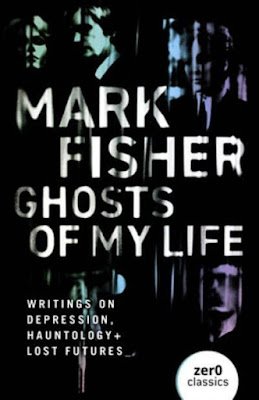On Mark Fisher and (Digital) Legacy
He did not have a Wikipedia page as far as I could tell, and when I hunted for one on that site I found some generic reference to his work on there which did not mark him as distinct in a way I thought was deserved (even now the page for Fisher’s Wiki page derides him as a ‘blogger’ and questions if he is deserving of a presence there, despite his PhD, lecturing work at Goldsmiths and enormous impact). The slightly generic aspect to his name, and more pertinently Fisher’s own lack of any apparent ego seemed to mean he did not have the online profile that his writing deserved. But I felt I needed to get in touch.
Why did I write to him? Us writers can be a proud lot, reluctant to wear our influences too openly. But with Fisher there was no such reservation. I had a tenuous link in that Fisher was involved with Zer0 Books, who were owned by the parent company, John Hunt Books, that were publishing my third novel.
In my- I now realise embarrassingly fawning- email I talked about his book ‘Ghosts Of My Life: Writings on Depression, Hauntology and Lost Futures’ which I said was ‘A fascinating read, in particular the aspects relating to musical culture and how our lives are, in this facet of popular culture, a recycling of previous ideas.’ The truth was there was not a writer alive who had agitated and provoked me in the way Fisher had. What I found so exciting about Zer0’s publications (my PhD supervisor Adam Hansen had leant me a copy of architecture-as-orgone tome ‘Militant Modernism’ by Owen Hatherley) was that they were not academia and yet they were also not journalism. Zer0’s books adopted the colloquial language of journalism but blended it with an academically informed tendency for an almost hallucinatory abstraction.
This made for visceral, thrilling and often challenging writing. Writing that had the buzz of a cheap pill and the nourishment of a Sunday roast. It triangulated new intellectual terrain for me. Crucially, Zer0 pumped out page after page of (at the time) cheaply printed volumes of this stuff. It seemed to me that from the left they were flooding new ideas into an arena which- if not academic- was academic enough to have a PhD supervisor turn his student towards. It was also writing that was lucid to the point of having some hyperreal quality. For me, Zer0 are the true publishing pioneers- in terms of content- of the last twenty years. Hatherley’s Soviet cultural references were a bit outré for me. But Fisher- who cited Ashes to Ashes, Sapphire & Steele, Kanye West and Joy Division to state his points about hauntology- was right up my strasse.
His work acted as a kind of Möbius Strip for contemporary culture, a clearing house by which the most esoteric elements of culture (from the sampling of Burial to the Batman films of Christopher Nolan) could be mined for their significance. And when is the exciting ever more exciting than when it is somehow familiar? Like Joy Press and Simon Reynolds, the rendering of a culture I recognised as intellectual and yet abstract enough to be illuminating emboldened me.
In this piece of digital fawning I emailed Fisher I drew a link between his writing about 'abandoned futures' and how it was influential to me given that the fictional singer in my novel wrote music that evoked futuristic dystopias (think Gary Numan meets Ian Curtis). This fictional singer character vanished into the postmodern ether in my plot. When his music was 'performed' it was by his former bandmates, with him as a Youtube video raging above their heads, his power muted by him being rendered in pixels. Like Fisher, I was interested in the authenticity of our emotional reactions to what was simulations. I added, ‘In trying to find Robert Wardner (the missing singer) the journalist protagonist is trying to unearth aspects of this abandoned future as well as fulfil a personal mission’. I had used Fisher's approach to create fiction in which characters unearthed lost futures. I asked if Fisher might be interested in considering an advance copy. When my two attempts bounced back (I did not realise his work at Goldsmiths was part time and his inbox perhaps erratically attended) I asked a mutual colleague to pass on my work, but got no reply.
The fact that someone like Fisher did not achieve academic tenure in his life and have the financial and institutional stability by which to consistently present his views sooner is a tragedy that speaks to the way our society undermines the vigour of our intellectual and cultural life. Not least with a government that seeks to attack, underfund and undermine The Humanities and further destabilise the lives of people who enrich our intellectual life who they will later commemorate in coins and opening ceremonies. Despite the fact being that, as of today at least, it is a government with both a Prime Minister and a Culture Secretary who self-describe as authors.
I kind of regret not trying harder to let Fisher know the effect his writing had had on me. There is something terminal about my appreciation of him, as there is something terminal about our appreciation for any writers and artists. Their influence flares, remains unresolved. We can read in Fisher's philosophy (that is was easier to imagine the end of the world than the end of capitalism) a synecdoche for his own pathology.
We know what happens next.
In 2017 I heard about Fisher’s suicide, after a long struggle with mental health where, disgracefully, the only GP support he had been offered was by phone. And for some reason I had an unusual compulsion to write a tribute piece to him which appeared shortly after in 3AM Magazine.
I had the sense that a key thinker (known by then for his bestselling work ‘Capitalist Realism’) in my era had gone and that it needed to be noted. To write about Fisher, and pay tribute to him, really was a compulsion. Just as reading Jung (and Fisher was deeply informed by the psychoanalysts, in the way The Humanities are steeped in Marxism) is dangerous to a young mind for the ideas it liberates so too was the way Fisher exhumed the nihilistic potential in the likes of Joy Division. In a reality which seems to loop, feedback, be simulated and recreated and at each step lose something untraceable Fisher responded with acuity. As a struggling writer who squirmed restlessly between fiction, academia and journalism he helped me find a voice. His subject matter was art full of hinterlands, borders (even if just the curtain in a David Lynch drama) simulacra and unresolved trauma. He was stepped in the psychoanalytic as a tool by which to appraise these liminal spaces- just as I was from my background.
In this tribute piece I wrote- ‘Mark Fisher’s writing succinctly summarised the confusing, alienating, and hypocritical narratives we find ourselves immersed in in 2017. I was so shocked to hear of his death yesterday that I decided to write a piece to further spread the word about his work.’
In the confusing, alienating and (Brexiters anyone?) hypocritical narratives of 2022 Mark Fisher has only grown more relevant. I was thrilled when in 2022 Zer0 published a volume of my politically-inflected writings on popular culture, ‘Albion’s Secret History: Snapshots of England’s Pop Rebels and Outsiders.’ Not least because the book steals wholesale Fisher’s journo-abstracted-academia constellation of influences for its whole pitch. One of Fisher’s main concerns, along with the insidious pervasiveness of capitalism, was clearly the erosion of culture. In an accompanying YouTube piece I recorded for Zer0’s YouTube channel- ‘Remembering A Time Before The Great Culture War’- I felt a sense of a personal circle being closed when I saw it’s top comment from a viewer was ‘Keeping Mark Fisher’s spirit alive.’
My intentions, half a decade on, are the same just after the anniversary of his birthday (he would have been 54 a couple of days ago). I now see that Fisher, far from not having a Wiki page dedicated to his work or a web presence by which he is contactable, has thankfully had much of his work published posthumously.
His reputation and influence is starting to have a sure footing thanks to the recent publications of his work by Repeater Books. In fact, speculative pieces of his that he left unfinished have been somewhat fleshed out since his death. His final lectures have been made into publications. Far from languishing in the doldrums of public attention, early death and the impact of his writing have transformed his legacy. I knew Fisher had 'made it' when I saw 'Capitalist Realism' on the bookshelf of a senior academic alongside the likes of Barthes and Zizek. The man who didn’t have enough about him online for a contact to be made is now starting to be recognised as a key thinker. As part of a publishing approach that has found its writing style filter into the mainstream without really having been given its due.
Long may that continue.
Mark Fisher’s work is available here
My tribute piece to Mark Fisher from 2017 is here
Albion’s Secret History: Snapshot’s of England’s Pop Rebels and Outsiders is available here
‘Remembering A Time Before The Great Culture War' is here












Comments
Post a Comment